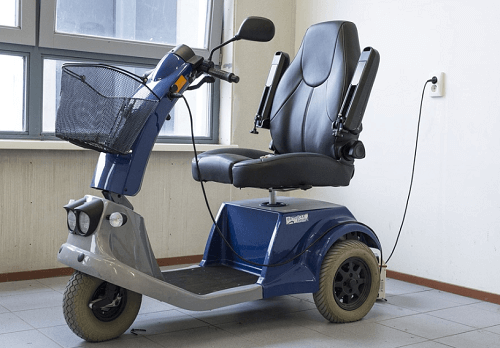 If you are one of the almost 16 million adults over 65 who experiences mobility difficulties, you may be considering renting or buying a mobility scooter to help you more readily get around. Mobility scooters are good options for those with limited mobility and can be great for helping you get places quicker and more safely than if you were to use a rollator walker or cane.
If you are one of the almost 16 million adults over 65 who experiences mobility difficulties, you may be considering renting or buying a mobility scooter to help you more readily get around. Mobility scooters are good options for those with limited mobility and can be great for helping you get places quicker and more safely than if you were to use a rollator walker or cane.
If you are in the market for a mobility scooter, don’t forget to ask yourself these 5 important questions:
How much weight will my scooter need to carry?
Mobility scooters are powered by small batteries that supply the electric charge they need to run efficiently and safely. While most scooters can carry up to 250 or 300 lbs., it is important to think about what the max weight you might be trying to transport.
If it gets close to that upper limit because of your own weight or additional items you might need to carry with you (i.e. in a basket attached to the scooter), you might want to look at options with higher weight capacities. Going uphill or over uneven terrain can be especially dangerous if the load on the scooter is heavier than it can handle.
Will my insurance help cover the cost of a scooter?
Depending on your medical needs, your health insurance provider may cover a partial amount or the total cost of your mobility scooter or power wheelchair. Typically, you qualify for full coverage if your doctor can certify that you are unable to use a different type of mobility aid like a walker, a cane, or a manual wheelchair.
Insurance companies, including Medicare, require that an “order” for the mobility scooter be sent from your doctor to a local medical supply company near you that is legally allowed to supply a scooter to you. From there, you will speak with a representative at the medical supply company so they can help you find the best type of scooter for your needs and living situation. If you choose to forgo the insurance route and simply buy a scooter at-cost on your own, you may have a wider selection available to you and can even look online for suppliers to ship one to you.
Do I have good hand dexterity and finger control?
Unfortunately, for seniors with nervous system disorders like multiple sclerosis or Parkinson’s which may result in disability, even though a mobility scooter could help them get around, it could be dangerous if they are physically unable to use the manual controls.
Mobility scooters designed specifically for people with disabilities are engineered to compensate for dexterity limitations, however, mobility scooters do still require some physical strength and control to operate. For example, there may be buttons to push, a joystick to toggle, or brake handles to squeeze.
Do I plan on transporting or traveling with my scooter?
While mobility scooters can offer more flexibility for getting around with a disability, traveling with one can be a whole other ballgame. Larger mobility scooters are typically designed to be used in and around the home, though there are varieties that can be disassembled for traveling.
If you do plan on taking your scooter on the road, make sure to pick one that is portable and that will also fit in the trunk of your car as needed. When traveling by air, experts recommend taking accessories like side mirrors, spare parts, and tools with you in a carry-on bag on the plane and checking your mobility scooter at the gate.
Will I be driving my mobility scooter outdoors?
While getting outside plays an important role in senior health and longevity, not all mobility scooters are built to traverse outdoor terrain. Where you normally venture in and around your community can affect the type of mobility scooter you purchase.
Heading outdoors means you may need a mobility scooter with a longer battery life as well as one with enhanced maneuverability and tires that can safely cover different types of terrain - grass, dirt, gravel, sand, etc.
Additional Factors You Want to Keep in Mind
Once you have decided on the type of mobility scooter you want to get, don’t forget to look for features that optimize on comfort, durability, and safety. Does your chair come with padded seating, armrests, and easy-to-reach controls? Do you need extra storage space, like an attached basket, for your keys, wallet, and phone? Are there built-in safety mechanisms that will help prevent the scooter from tipping over or getting caught?
All these important questions will empower your purchasing decision when it comes to finding the perfect mobility scooter for you.


Comments